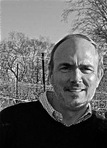R.J. Heller's Blog: Life Downeast
August 31, 2025
Fathers and sons
We all try to emulate our parents in one way or another. Sometimes it is with the embrace of a lesson learned, a skill mastered or a full-fledged attempt to follow in their footsteps. Here Downeast the importance of work is apparent and with it comes an intense desire to learn and follow the lead of a parent. The young watch, learn, and ultimately end up doing what it is they are taught. Perseverance is deftly on display in the commitment that the work will continue no matter what.
Growing up in Pennsylvania I watched my father go to work and make a living as a carpenter. Occasionally he moonlighted on weekends or evenings building things for people to use or places for them to live. As I grew older the watching ended and the process of doing took hold. I found myself tagging along with my father, observing and helping where I could.
I found out much later in life that those skills he taught me are still present. The things we did together lay dormant for a time underneath the other experiences in life. The skills I learned back then matter now as we carve out this new life for ourselves. Today’s building projects in Maine are a constant reminder of those days spent working with my father.
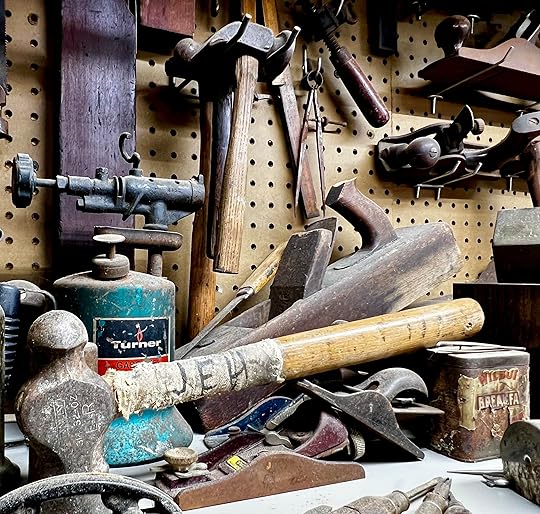
In the early morning hours of any Downeast harbor you will see the same thing I experienced as a boy. The only difference being the serious focus attached to the activity. The young watch the old and the old teach the young in both words and action. Hands on experience is the way it’s done in this classroom.
Steering a boat, reading the water and weather, preparing bait for the ride out or loading and stacking tackle and traps — doing is learning. The sound of it is magical, the rhythm of it seduces the soul. It is a cadence of life buoyed by work that can only be found if one looks and listens for it. It is this Downeast cadence that provides for families and makes this place special.
To make a living is a primary objective for all of us. Sometimes we like the job we have, sometimes we do not, but we know in order to live life we must do something. This area does not offer many job opportunities. Industries are centered on fishing and timber and have been that way from the beginning.
This “limitation” sets in motion a determined spirit and a true sense of stewardship over a place that is both hard and beautiful. Downeasters learn from each other and exemplify the true spirit of teamwork. If industries were bountiful and jobs were plenty, then this place we call home would not be the Downeast we have come to know and love.
On my trips home I find myself sometimes driving to some of the spots I worked along side my father. I look to see if the small buildings and deck projects are still there. They are. I also see some of his work on a much grander scale in the brick and mortar of institutions of learning, medicine and recreation, buildings that provide service and in their own unique way support that cadence of life there.

Here Downeast I go down to the harbor to be reminded of what I experienced with my father. I see sons learning and most assuredly following in the footsteps of a father or grandfather. I look out to the waters deep and cold and imagine everyone there on the docks doing the same thing. They look out to both past, present and future seeing the product of their work — father and son — on a sea of experience.
The post Fathers and sons appeared first on RJ Heller.
June 6, 2025
William Prescott — A friend and mentor to many
This is a column I write occasionally titled, One Life Downeast. It is all about one person’s life lived Downeast. I was fortunate not only to know Bill Prescott but to count him as both friend and mentor to me and my family. Our daughter graduated in 2008 from UMM with a degree in Elementary Education and Bill was her advisor, friend and mentor. Their relationship was special, as many people who knew Bill could attest to. He was loving, caring and inspirational. And even though I could never persuade him to change “sides” he being a Yankees fan, I loved and respected the man, for he did the same for our daughter and this Downeast community. Godspeed Bill, the life-lessons you taught will most certainly endure. — RJ Heller
*******
“I love my view of Bucks Harbor from my dining room window, and most importantly I enjoy being around my family and friends.”
Friends, family and teaching are what drives William Prescott every day. Though he does not teach in the classroom anymore, he remains a teacher. Setting the bar high, Prescott bestows life lessons to his children, his grandchildren and great-grandchildren. And he remains a mentor to all of those students he taught along the way.
During a 1940 snowstorm in Jonesport, Prescott was born in his grandmother’s house. He then spent his childhood growing up in a house his father built on Corn Hill in Machiasport. He has lived in Maine all of his life, with the exception of one year when he completed his master’s degree at the University of Connecticut.
His teaching career began in 1962 in Lincoln. Nine years later he, his wife Sandra and the family moved to Hamden, where he taught high school. Eventually Prescott made his way back Downeast to Bucks Harbor and as principal at Machias Memorial High School (MMHS) in 1981. The Prescotts have three children, four grandchildren and three great-grandchildren.
What draws a smile to Prescott’s face when talking about this Downeast place? The people. “For the most part, I really like the people in Washington County. They are honest, hard-working and generous,” he says.
As far as challenges living Downeast, he says: “I resent that there is such income inequality, because many hard-working people do not get paid what they are worth. Another challenge is that we are isolated from many resources, such as shopping and medical care.”
One topic that brings him joy is education. “Education is very important to me and I know its value because it made me understand that, as a teacher, I was doing something very significant. I strongly believe a teacher can be one of the most influential people for youngsters, and the best teachers understand how to work with students at all levels and meet them where they are.”
Prescott’s journey into education began with his father’s guidance and was supported by others along the way. “When I was a kid, all the boys in the town would go fishing off the wharf, and we liked to go into Clarence Miller’s store and listen to the older people tell stories about the town. I remember one day Clarence grabbing me by the shoulders, lifting me on the counter and saying ‘Don’t you quit school.’”
Prescott did stay in school. He attended Washington Academy, where he played basketball and was a member of the 1958 championship team. “We beat Danforth finally after 4 overtime periods,” says Prescott. “Harlan Libby had the winning shot, and this was a great thrill in my life. A member of the community purchased the entire team letterman jackets and sent us on a trip to Boston for a tour of the city.”
After graduating high school, Prescott wanted to join the Navy but his father steered him towards college. “College was unaffordable, but I heeded father’s advice and attended Washington State Teachers College in Machias. I paid my tuition by working at the sardine factory, digging clams and working for my father at his garage.” Prescott also recalls Clarence Miller’s help by giving him a tab so he could pay for gas.
Throughout his teaching career Prescott always answered the call for “just one more day” in the classroom. After 14 years as the longest-tenured principal at MMHS, Prescott retired in 1994. Then another call came, leading him full circle back to a beginning. “After my retirement, I was contacted by Virginia Cheney, the director of student teachers at UMM. Ginny said, ‘Bill, I’m up against it, and was calling to ask if you would be willing to teach an algebra course,’ in which I replied, ‘When do you want me to start?’”
After a 47-year career it is easy for Prescott to recall what excited him most. “The most fulfilling part of my work at UMM was working with student teachers,” says Prescott. “It was the most gratifying part of my entire educational career because the student teachers reinforced my belief that education is the most important endeavor.”
Prescott holds close a quote by the anthropologist and teacher Margaret Mead that reinforced his own approach to teaching: “Children must be taught how to think, not what to think.”

Bill Prescott fishing with his great-grandson Bentley. “I always look forward to fishing, watching the Yankees, reading and keeping my mind occupied.”
Amidst those years as an educator, Prescott also devoted time to the community of Machiasport, serving 11 years as a selectman, then as a member of both the planning and school board. Prescott’s life is a storybook of service.
Today he enjoys fishing at the family’s lakeside camp, especially with his grandchildren and great-grandchildren. That time shared — with fishing rod in hand — surrounded by childish giggles when a fish is on is a pure, perfect moment.
One last thought Prescott has is a life lesson. “I want people to know that I have always cared, have tried to be helpful and always had the best intentions in mind, even when it may not have seemed that way at the time. I have consistently tried to live up to the words of my father, ‘We can disagree without being disagreeable.’”
Caring, helpful and a life lived by example are this teacher’s lessons, part of a life well-lived Downeast.
© RJ Heller 2024
Published inThe Quoddy Tides, November 22, 2024
The post William Prescott — A friend and mentor to many appeared first on RJ Heller.
October 14, 2024
When someone leaves
When someone leaves, their absence remains. It floats like fog upon the water, seeking a place to sit and dine with friends, family and the community. And when the meal is over at the table of life, people head home to other lives, other responsibilities while that absence stays behind. For their place-setting at that table remains forever because of community, because of friends and family. This Downeast place is no different.

When someone leaves, the void that remains feels limitless, the task ahead daunting. But this community has proven time and again that it moves into the emotion — wanting to hold the moment — needing to help in any way. Just as he always did, the community makes us whole, makes us feel good and most of all is a constant companion in good times and bad.
Bill Kitchen, the Machias town manager who dies on September 9, impacted many people. In his short time here, surrounded by many ‘from here,” this person “from away” made his mark by touching the heart of this community. Machias will continue to move forward because of the touchstones Bill left behind.
His departure was sudden. How could it not be? Bill would not be Bill if it was any other way. His presence everywhere was spontaneous. One did not know if he was coming or going, though you always knew he would give whatever time necessary to impact the moment, to listen and to offer his thoughts.
My first memory of Bill was in Cutler. I had just arrived Downeast, and I was assigned by The Quoddy Tides to take photos of the lobster crate races during the town’s July Fourth celebration. I did not know what a lobster crate race was but did as I was asked. Bill was there covering the event for the Machias Valley News Observer. I, the fledgling amateur, must have taken a half hour and a myriad of positions to get in place to capture “that shot.” Bill came striding down the wharf with camera in hand as the first contestant is midway across the crates. He stopped, raised the camera and snapped, smiling at me saying: “How cool is this?” He then left with a single photo. That moment was over, and Bill had moved on.
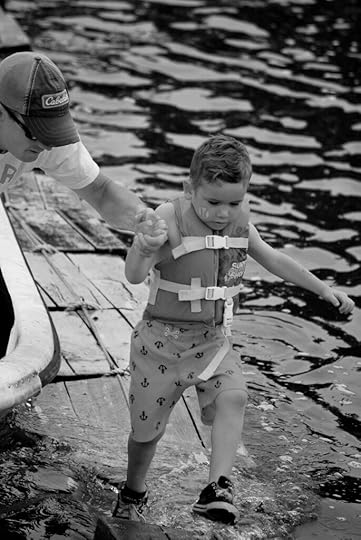 After that we saw more of each other covering various events. We began talking, we began sharing our thoughts on writing, photography and about this place we both called home. We talked about its quirks, the postcard quality of its boundless beauty tucked in every corner and, of course, the people. Bill loved talking about others.
After that we saw more of each other covering various events. We began talking, we began sharing our thoughts on writing, photography and about this place we both called home. We talked about its quirks, the postcard quality of its boundless beauty tucked in every corner and, of course, the people. Bill loved talking about others.
 Bill Kitchen was many things to many people. For me he was that little boy who never grew up “inside.” He is that “catcher in the rye,” there to protect and catch us if we fall from our childlike fascination of the world, trying to protect us and keep at bay the world’s phoniness we as adults sadly accept.
Bill Kitchen was many things to many people. For me he was that little boy who never grew up “inside.” He is that “catcher in the rye,” there to protect and catch us if we fall from our childlike fascination of the world, trying to protect us and keep at bay the world’s phoniness we as adults sadly accept.
The last time I saw Bill was five days before he left. It was at the place that once served countless Downeast families for three decades. Last year the Bluebird Ranch Family Restaurant decided to turn the page, give someone else the privilege to make a go of it in Machias. Bill helped fill that void and the community it served.
Our conversation was brief but long enough for each of us to give the other an update on our lives. Both of us having a penchant for the water and sailing, Bill shared that he was looking to purchase a small sailboat. And he, as always, sensing my reply said: “Yes, we will go sailing one day.” And then we said our goodbye the way will always did — a smile, a handshake and a long hug.
When someone leaves, we look for reminders of them. As a community we will all look for reminders of Bill, and they will not be hard to find throughout this Downeast place. This place he loved will continue to love him right back by being the community it always is, no matter the challenge, no matter the circumstance. Its resilient, loving and supportive nature will be guided by his presence and his absence. Both equally, both lovingly.
When someone leaves their essence remains. It becomes part and parcel of what now is and will be forever. I remain resolute in my belief that a place absorbs all the goodness we each dole out, making it shine bright, making it better, because in everything that is there is something that was.
When someone leaves, we cling to memories that will sustain — a buoy for us to grab when needed, to comfort, to laugh with, to smile while remembering and reflecting. Every time I hear that camera shutter click, I will smile remembering that little boy running across those crates trying not to fall in the water and over my shoulder his smiling voice saying: “How cool is this?”

And every morning I will look out across the water to the horizon, knowing he is out there sailing his boat on the waters he so loved, lighting a path to make his “here” a better place.
When someone leaves, we are because they were.
© RJ Heller 2024
Published inThe Quoddy Tides, September 27, 2024
The post When someone leaves appeared first on RJ Heller.
August 1, 2024
Here an island
Rigged lines pull taunt, coax a perfunctory billow of sail
Once received, never to perish
Wind perhaps or my own breath?
Maybe both
The sea rises again and again, pushes, pulls, leaving me here, taking me there, now everywhere; horizon mocks, tells stories, calls me names, gulls laugh, cry, I too, in tears, spittle and sweat; colors go dry, blue to grey, white to haze, fog rolls, erases everything.
Here am I
*****
A precipice rises from flat sea, overwhelms a steeped desire
Tears puddle, waves embrace
Sand conjures itself to receive
Companionship consoles
Muscles punch salt, white, wet; an awkward pursuit, palms pull
Wood splinters, hands caked
Firm ground within reach
Almost, Almost
*****
The sea rises again and again, pushes, pulls, leaving me here, taking me there, now everywhere; horizon mocks, tells stories, calls me names, gulls laugh, cry, I too, in tears, spittle and sweat; colors go dry, blue to grey, white to haze, fog rolls, erases everything.
Here am I
Drifting again, tall firs stab holes into the sky
Siren sea hums, driftwood table sits
Bone, shell and stone my companions
Here an island
© 2019 RJ Heller
© 2024 (Revised) RJ Heller
The post Here an island appeared first on RJ Heller.
July 28, 2024
A conversation with Jasper Beach
There is an almost perfect concave-cupped cove in Machiasport that will listen to your thoughts. It has been here for eons of time. Its shore is covered in stones of all size, shape and color. There is no sand here, only brightly polished stones of granite, red rhyolite, quartzite and other rock reduced in size as primordial seconds roll into millenniums. The waters of Machias Bay with wave after wave blesses the beach with answers to questions, many not yet asked.

Photo courtesy Ryan Maluski Malagara
Jasper Beach is a special place. Its remoteness, though right off a road, embraces a collective essence as one passes through the small villages of Larabee, Bucks Harbor, East Side and Starboard and provides a stoic welcome that will relieve just about any of the day’s ills.
That road known as “Port” has a beginning point in Machias and another in Starboard. In between is that “remote essence” that can only be found Downeast. A working harbor, white-steeple churches, friendly hand waves, historic parks and buildings, trees, hills, mudflats and ocean views that touch the horizon greet the traveler. For when traveling Downeast there are no end points, only beginnings.
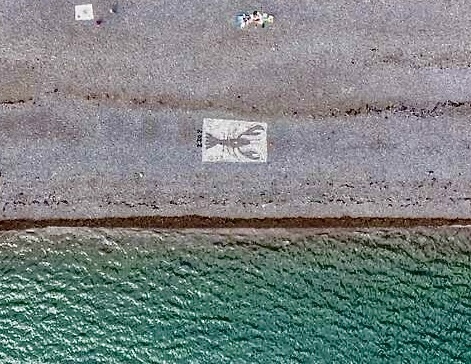
Photo courtesy Ryan Maluski Malagara
Many people who visited Jasper Beach have shared their experience. In writings, in song, many in photographs, video and in sculpture, people express the connection they feel while visiting. Delicately balanced stone cairns are built or messages uniquely spelled out in different size and colors of stone, even a large lobster — shaped from beach stones — arrived to claim its 15-minutes of fame just a couple of years ago. Created by a family visiting the area, it was their totem to both a special place and an artful expression of their gratitude for their questions being answered that day.
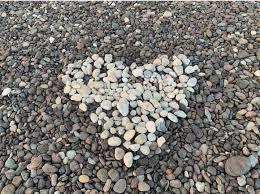 Whenever I visit Jasper Beach I make time to allow this place to give me its time. I sit with eyes closed. The wind arrives, pulling at my thoughts. The Downeast sunlight on my face is a warm compress that soothes, allowing me to relax even more and enjoy the show. The lights go dim as the ocean’s waves beckon. I can hear each wave borne off the ocean’s floor rise, move forward as older waves move back out to sea. The wave curls then crashes onto the beach of stones, creeping ever closer towards me. When the wave flattens on
Whenever I visit Jasper Beach I make time to allow this place to give me its time. I sit with eyes closed. The wind arrives, pulling at my thoughts. The Downeast sunlight on my face is a warm compress that soothes, allowing me to relax even more and enjoy the show. The lights go dim as the ocean’s waves beckon. I can hear each wave borne off the ocean’s floor rise, move forward as older waves move back out to sea. The wave curls then crashes onto the beach of stones, creeping ever closer towards me. When the wave flattens on 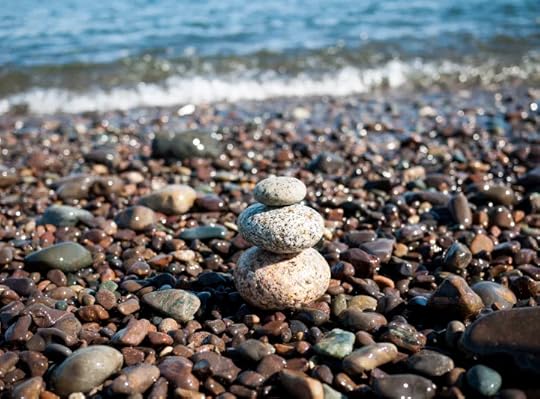 the shore, the stone’s song is suspended in silence until the wave pulls back, a grand finale of nature’s play over and over again with a myriad of stones singing and clapping their appreciation. And I am here, and in my mind I am clapping, too.
the shore, the stone’s song is suspended in silence until the wave pulls back, a grand finale of nature’s play over and over again with a myriad of stones singing and clapping their appreciation. And I am here, and in my mind I am clapping, too.
Each of the seemingly infinite number of stones harbor something unique — perhaps the answer to your question. Anyone can be found in thought amidst the song and stories being made here each and every day. I describe it as a chorus of “yesterdays” taking visitors to a better place at that moment.
To spend time at this place with eyes closed, asking questions, sharing feelings or simply sitting quiet, alone and detached from it all listening to the stones sing a song that changes with every wave is special. Every second of time has been captured here and reveals itself through the interaction of the tides, the ocean’s waves and the stone’s storytelling.
It is a rare occurrence to find reliability given that a companion to our day-to-day machinations is unreliability. It is a troubling constant that stands erect through our weeks, our months and our years. Life’s chaos and unpredictability are undaunted.
At Jasper Beach there is reliability, there is calm, there is resolute determination, there is serenity and beauty, there is water and there are the stones and the stories they tell to those that listen. It is as if being surrounded by trusted friends in a place that offers a solemnity unmatched amidst tide and water.

And the exclamation point is that these revelations are seen, heard and enjoyed by all who visit. The tide then returns to wash all of it back into the sea so others can arrive with clean slate in hand and have their own experience again and again. Lives are revealed in stones and water every day. And like the lives of those who a visit like this touches, the stones must remain as they are, where they are, so they can continue doing what they have been doing for eons of time. Because to arrive, spend time and then leave a place as it is found gives added meaning to both that moment and especially the place that moment found for you.
© 2024 RJ Heller
First published: The Quoddy Tides, April 12, 2024
The post A conversation with Jasper Beach appeared first on RJ Heller.
July 25, 2024
Needing to be tough in a fragile world
I first heard the term “The Greatest Generation” from television journalist and author Tom Brokaw’s book. After some study I learned that it was first used by a general upon retirement addressing Congress after having led the Eighth Army in World War II and the Korean War. “The men of the Eighth Army are a magnificent lot, and I have always said the greatest generation of Americans we have ever produced.”
In Brokaw’s book he profiles Americans who came of age during the Great Depression and went on to fight in World War II. In it are stories of those that stayed behind and contributed to the war effort any way they could. Brokaw noted that this was not done for “fame or recognition” but because it was “the right thing to do.”
The many that stayed behind served silently by going without. They worked extra shifts, turned the lights out, cut back anyway they could in support of the common good for all. They made hard choices doing so with fervor when time and circumstance required them to do so.
People made sacrifices because they knew others were fighting the fight on their behalf. Those fighting the fight did so at their own peril and held no preconceived expectations of glory or fame; they expected no accolades, no praise. They did their job.
Compared to the generations of that time and of our own families who came before us, I believe our human condition is much weaker now than before. We have grown soft over time. Our feelings are frayed easily and physically we look to technology to remedy just about any challenge. Our societal ways and approach to just about everything has more to do with us as individuals and what others might think instead of what needs to be done for others.
In David McCullough’s book John Adams, the second U.S. president, who many would posit was a real pain, was both irascible in his temperament and tough physically, as were many during that time in history. He did not dawdle with life but carried on, whatever the cost.
In a talk McCullough gave to elementary school students, a question was asked: What made these men so different from us today? “A great question.” McCullough commented. His answer in two words: “Their toughness.” McCullough then went on to say: “Not only were these men very well read, intelligent and collectively on a mission towards independence, but they were tough physically and mentally.”
He then referenced the opening of his book. February of 1775, Adams began his journey on horseback from Braintree, Mass., to Philadelphia. Adams rode through a snowstorm on heavily ice-covered dirt roads and then through mud for over 600 miles to arrive in time for the start of the first Continental Congress.
Today we grumble about just about everything. Having to drive back to the store because we forgot something; too many commercials on TV interrupting our favorite program; lack of “likes” on a social media post; the cost to live life all while worrying about how we look, feel, what others might think and that tomorrow will pretty much be the same as today.
Adams did not expect fanfare at the end of his journey. He did not commiserate on the tough journey. He expected to get to work soon after arriving. He did his job. I sense that many of us today, when asked the question, “What made are ancestors so different from us today,” would answer that they were much more resilient and tougher than we are today.
 We need not look back far to find that toughness — perhaps one or two generations to find that resolute toughness. Faced with adversity, hardships and the trials of both life and society, they all persevered in their own way and they did so without complaint. “That’s just the way it was,” I remember my great-grandfather saying to me one Christmas. “We did (live), and we did so without.”
We need not look back far to find that toughness — perhaps one or two generations to find that resolute toughness. Faced with adversity, hardships and the trials of both life and society, they all persevered in their own way and they did so without complaint. “That’s just the way it was,” I remember my great-grandfather saying to me one Christmas. “We did (live), and we did so without.”
My great-grandfather worked 50 years at a silk mill in Allentown, Penn. Upon retiring he owned a neighborhood grocery store. There he, and his wife served customers from the neighborhood. When he was in his 80s with the grocery store long gone and he a widower, my great-grandfather walked a route delivering newspapers every morning, “so I could be of use and stay active,” he said.
If he were alive today he would be amused by what we are challenged with, what frustrates us. He would be shocked at the luxuries — now considered essentials — afforded us through technology. Has that technology made us “soft?” Yes, sadly, I believe it has.
And much like Adams or those who served in uniform or in the factories during times of strife and war or as a man doing what he could till the very end, they all would look us sternly in the eye and say: “Get on with it, and stop your grumbling.”
My great-grandfather was born in 1887. Today, he would warn that every minute of worry or anger takes two minutes away from enjoying the abundance that life offers. He would also remind that we should heed the wisdom of those that came before us while applying the memory of their fortitude.
© 2024 RJ Heller
First published: The Quoddy Tides, March 22, 2024
The post Needing to be tough in a fragile world appeared first on RJ Heller.
February 14, 2024
Some thoughts from a PFA
I forget what the conversation was about, but I remember it happening just after my wife and I moved here to live the proverbial “the way life should be.” Someone said to me: “You wouldn’t understand because you are a person from away.” I asked: “What’s a person from away?” He looked at me, smiled and said: “You are. You are a PFA.” I smiled back, shrugged my shoulders and we continued on with our friendly conversation.
A “person from away” is not a Mainer; succinctly, it meant I was not born here, nor were my parents. The degree of lineage may vary from coastal towns and cities like Portland, but the result is the same — I will always be a person from away.
Why does this descriptor not irritate me? Where I grew up I do not recall people not from Pennsylvania as being “from away.” Why here, why Maine? Because what I’ve learned after spending time here is that Maine’s essence comes from the deep interconnectedness of its people and the communities those people built over time.

In 2003, we purchased our home here Downeast. During the summers, we rented to visitors looking to experience what I still call the “real” Maine. Before that first summer rental I asked a Maine friend of mine about an old access path through my property. He told me it was an old trail that fishermen would use to get their gear to the shoreline. It was somewhat overgrown, but he said not to be surprised if a 4-wheeler makes its way out from time to time, trying to save time by taking a short cut.
My inclination was to be proactive and proceed with signs and a closure of some sort. My friend immediately scolded me by telling me that is not the way it’s done around here. He then repeated something I learned as a kid while in the woods at a YMCA summer camp: Know where you are by learning the lay of the land. I listened to my friend then and am better for it today.
While home prices here surge, a bevy of homebuyers are flocking to Maine. The proof is in the parking lot outside the grocery store and in the aged “For Sale” signs now gone from front yards up and down these coastal roads. This is, in large part, as much due to the pandemic as it is to the remote natural beauty and — in some people’s minds — the perceived safety this area’s isolation can provide.
But there is something else that arrives when people from away unload trucks of furniture — they bring preconceived notions and habits to their new home. I did. It’s a human tendency we all have. And I get that; but Maine is different. It’s not perfect, but in my book, it’s pretty close. So here are a few thoughts for those contemplating a move Downeast.
 First, get to know the place by spending quality time interacting with the people who have grown up here. Be observant, be respectful and learn the lay of the land before even contemplating owning a piece of it. Listen to the locals, and when you think you’ve “got it,” listen some more. Experience how they interact in both good and bad situations; see how they solve problems and how they help one another; and, most importantly, learn how they let someone know when that’s not the way things are done here.
First, get to know the place by spending quality time interacting with the people who have grown up here. Be observant, be respectful and learn the lay of the land before even contemplating owning a piece of it. Listen to the locals, and when you think you’ve “got it,” listen some more. Experience how they interact in both good and bad situations; see how they solve problems and how they help one another; and, most importantly, learn how they let someone know when that’s not the way things are done here.
Then, ask questions. Be open to learn things that are relevant when it comes to becoming a part of this place. Know that Maine’s history and culture run deep. Social ties of residents passionately drive life in this remote place with many families here having not ventured far from their roots. For some, they have lived in the same town, the very same house, as did their ancestors. It is a system of life that developed over time from a mutual shared experience that harbors unwritten rules of engagement for a life they only know one way to live. Something I read some time ago summed it up nicely: “Being a Mainer then, does not just designate residency. It denotes a state of mind, a shared experience which can only be understood through meaningful engagement with culture and community.”
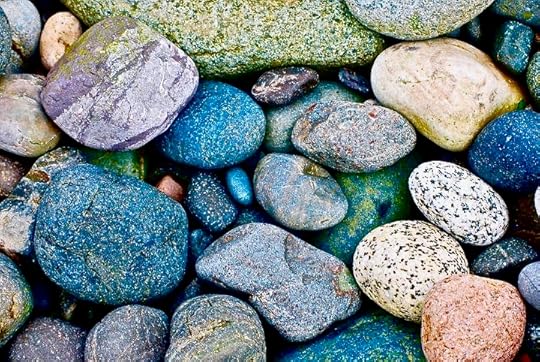
Any place can be uniquely beautiful, but it’s the people who have lived there all their lives who are the caretakers. Mainers know what they’re doing, and you — the vacationer, the new resident, even the one-time visitor — are here because of that. So, contribute whenever possible and however you can; Mainers will accept and respect ideas, especially when they foster that same sense of place they hold dear.
Every day my interactions in both sight and sound sustain me to the next day. For the unexpected will occur, people will cross my path, they will ask of me and I will ask of them, and together we take care of this community and respect each other in the process. I may never be a Mainer, but I am happy to be a part of and contribute to that which makes this place so special.
© RJ Heller 2021
Originally published The Quoddy Tides, August 27, 2021
The post Some thoughts from a PFA appeared first on RJ Heller.
November 19, 2023
A Portrait to Paint
In a house, one can walk into each room and feel completely different. Still, there is an essence that floats within these spaces — an essence that is both familiar and different, at times shared yet always personal — this is home. And like those rooms are the poems found in Andréa Suarez Hill’s latest collection, A Portrait to Paint.
 This is an expansive collection — 62 pieces in all — of finely tuned eloquence packaged and held together by emotive strands of revelation.
This is an expansive collection — 62 pieces in all — of finely tuned eloquence packaged and held together by emotive strands of revelation.
The collection is arranged in three sections, the universal or WE, the shared YOU and the most personal of the bunch, the singular ME. These are the “rooms” a reader will explore and no doubt be touched by.
Suarez Hill grew up in New England. She moved to Maine in 1987 after having a career in print, broadcast and photojournalism. She and her husband live on the saltwater farm they created together in Jonesboro. She is also the author of the poetry collection titled The Making of Budworm Farm, and her work has also appeared in poetry anthologies.
In the first section, Hill moves through the outer rooms of WE as humanity. Mankind is dealing with life as it happens: climate change, politics, societal injustice and a pandemic.
In the opening piece, “Tikkun Olam,” Hebrew meaning “repairing the world,” Hill strikes a nerve, bringing the brutal reality that is a pandemic. She lays the ghost bare for all to see and, in a sense, allows the healing to begin, to wrap its arms around us all.
“a blue sky river runs
between the trees above me,
arcing in easterlies that
hum through them and
cut a path that sounds like grief,
a human current”
The second section, YOU, is about relationships, whether those of people, place or animal. Hill conjures the deep-seated emotional ties that bind us as humans to something other than our self and in doing so makes us realize it is our relationships that make us better humans. This is her homage to the past and present.
In “Lesson,” Hill captures in metaphorical brilliance our need to slow it down, listen, give and most importantly receive the moment. She reflects all of this from atop her horse on a ride that is, for her, forever.
“Feel what I say.
Forget self, give.
Be generous with
Hands, reins, reward.
Every
Ride is a refuge,
Within is without.
When you listen,
questions are answered.”
And in the final section, ME, Hill shares pure thought and emotion with every word placed down on the page. Her thumbprint presses down, revealing the wonder in both nature and in her memories as a child, a family member and as a friend.
In “Rebirth,” I believe Hill summates the wonder of her life amidst loss and captures that essence that floats within all of the rooms that is her world, that is her home.
“A rose glow opens the eastern sky, Hues from sacred worlds bloom, a Persian pastel palette, saffron, alabaster, lazuline blue, Titian’s and Tintoretto’s tools…
my shadow lies long, together we step to the barn as wet grain mash, warm water and breath steam in the nether space between dawn and day more a feeling than a being…
morning sounds in silence, trees crack, snow crunches beneath equine feet, geese honk in coves below, the clatter of deer hooves on iced ground when they scatter…
nature is a painter who makes music, her aura eclipses humanity. I sense a voice say ‘amen’ to bless the moment, bear witness to her beauty and awake my heart.”
In this collection one will find something to touch the heart, to converse with sometimes intellectually often emotionally and to listen to attentively when the words are spoken, perhaps even to help mitigate or understand better societal imperfection and its lasting impact on life today. This is poetry that is personal and necessary.
That is what poetry sometimes must be — a woven tapestry of necessary conversations coming from all the rooms of a world, horrid, beautiful and resilient. All of it here in this collection sweeps us to a better understanding, a better place, if but for a moment. This is confident writing from a gifted writer and poet.
© 2023 RJ Heller
Austin Macauley Publishers, 2023, softcover $9.95
First published in The Quoddy Tides, Eastport, Maine: September 22, 2023
The post A Portrait to Paint appeared first on RJ Heller.
It’s all about the journey
“Slow down driver, wanna stay alive, I wanna make this journey last” — Paul McCartney
*******
This song from McCartney’s first album after forming the band Wings always brings me to a reflective moment. The song reminds me of something I always told my children as they were growing up: “Always remember, it’s all about the journey.”
My two children, now adults, remember me saying this to them almost as ritual in our household. And often they would roll their eyes or nod in agreement just so they could move away from the dread of another “talk.” I did the same thing whenever my parents broached a teaching moment with me. Getting older is when I realized that those teaching moments are an integral perspective to always keep in front when navigating life.
Time moves fast, and many of us take it for granted. We take photos to try and capture time, but in the process of getting the “right” shot, we often miss the moment. Today in life there are no second chances. I am a photographer and enjoy capturing images of life within and around me. But if we really want to experience the journey, we need to sometimes go it alone. Watch, listen and become the moment by leaving the camera home.
Both of my children have embraced the journey lesson within their own lives. My son even has my advice tattooed on his shoulder as an emblem of a father’s words to a future that awaits him around every corner. My daughter, a teacher, inspires children to be the best they can be but always to be themselves first and try new and exciting things even if they seem “icky” in the beginning.
I surmise that is the reason I hold explorers in high esteem. A man or a woman who chooses to move from a comfortable seat at the table of life to journey the unknown, to explore the confines of a sometimes not so hospitable place is both courageous and inspirational. It is the human spirit that compels us to do so — to explore is to find.
But what does the explorer say when they return and put memory to page? It was not the beginning or the end that most inspires, but the journey itself. The heroics, the tragedy, the turmoil and struggle, the joy, the sorrow and that utter feeling of being alive, all of it holds the essence of that journey. That “sense of being” cannot be replicated. To journey is to move from one posture in life to that of another while absorbing the experience of the people and place that surround it all.
To touch a point on a map that beckons our arrival, then set foot on that spot to collect what has been there waiting for us to find is what makes life special. To explore is to see life, and most assuredly it is the journey itself that is life.
That journey can also be waiting right outside our door every day. A walk in the woods, a hike up a mountain or a paddle down a stream, at work, at play, in the presence of many or at a table for one, it is not the beginning or the end but the journey within the moment that is special.

RJ Heller, photo
About 12 years ago, just prior to leaving for Alaska on a six-day dogsledding adventure into the Yukon Territory, I took time to reflect on why I needed to make that trip. That reflection ended up in a collection of prose and poetry I went on to publish. My view of that journey taken so long ago has not changed at all. In fact, I believe it is even more embedded in my soul today.
“We experience because to do so means we are alive. We experience life through our interactions with people and place. Not because they are there, but because a small piece of who we are is. We are in all places.
“From the day we are born, a small fragment of who we are, or more importantly, who we will become is waiting to be found. Waiting to be realized and at the same time become a part of our life.” — “A Journey” from the book Holding Grace by RJ Heller.
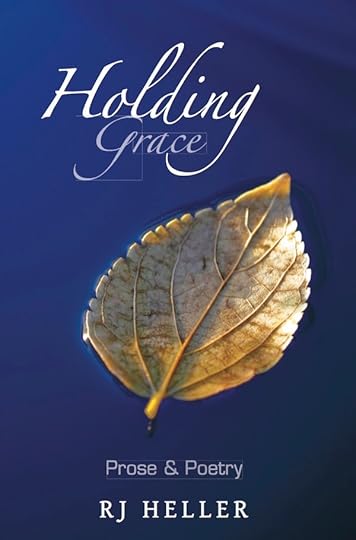 Time quickens as we grow older, and with it our memories begin to fold in upon themselves. That is why making new memories is so important when afforded the opportunity to do so. To journey provides us the ability to make memories.
Time quickens as we grow older, and with it our memories begin to fold in upon themselves. That is why making new memories is so important when afforded the opportunity to do so. To journey provides us the ability to make memories.
Life is about seeing and experiencing. If we put off doing that, we detract from what our life was meant to be, we muzzle the potential and in the process close doors of opportunity that could have been good or bad. Never knowing the outcome is even worse.
© 2023 RJ Heller
Published in The Quoddy Tides, Eastport, Maine: August 11, 2023
The post It’s all about the journey appeared first on RJ Heller.
April 27, 2023
A Downeast life in Cutler
For Captain. Andrew Patterson: 1956 — 2023

The boat ride to the island is a trip for the senses. The wind touches one’s face; the sound of waves, the boat’s motor amidst the cry of hovering gulls all compete for acceptance. The passengers on board the Barbara Frost crane their necks to see and hear everything. The captain — tall, broad shouldered — speaks in a loud. excitable voice. He is a little boy again traveling from wave to wave spewing history and stories, sharing his knowledge about this place — a place he protects yet shares with anyone who ventures into his harbor home. That place is Cutler
*******
Every Downeast town is special. And in every town there is that one person or persons who embody an essence that makes that place so special. They are a part of the community, yet the many others who live there believe that person or persons are the “soul” of that community. Travel coastal Route 191 and you will eventually find yourself passing through Cutler. It is a picture yearning for a postcard, and you don’t realize that until it’s in your rearview mirror. Turning around to go back is the smartest thing you will do that day.
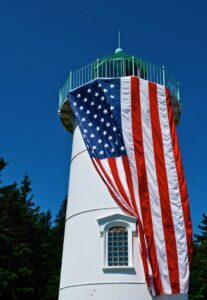
With the Bold Coast at its back door, Western Head at its front, Little River Lighthouse keeping watch at its harbor’s entrance, a former naval base accentuated by its tall, finger-like radio towers flashing red and a number of working wharves, Cutler remains a fishing village for the 500 or so souls who call it home.

In his book The Rockbound Coast, photographer Christopher Little shared his experiences in a number of places during his 1991 sailing journey down the coast of Maine. His stop in Cutler was less about enjoying what many consider the quintessential coastal village and more about finding a much-needed boat part.
 Little found the part. But he also found a town brimming with friendly conversation from people he did not know. He located the part yet stayed longer because of those people and their mutual intent to make him feel at home.
Little found the part. But he also found a town brimming with friendly conversation from people he did not know. He located the part yet stayed longer because of those people and their mutual intent to make him feel at home.
With names like Cates, Corbett, Davis, Farris and others, Cutler became its own unique place. People came, stayed and built a life. Others would visit every summer, and many still do. Cutler and the people who came and stayed benefited each other. Their contributions continue and are buoyed by strong bonds that exist today between a place and its people. Andrew Patterson is one of those people
I did not personally know Captain Andy, as many call him. I first met him as a passenger on his boat heading to Machias Seal Island. To watch the Atlantic puffins and other migrating birds nesting on its rocky ledges is a unique experience made better by the pure companionship extended by the captain who takes you there.
 He was a boat captain, an airplane pilot, a devoted family man and a passionate community member. At home, Patterson lived life by offering himself with his knowledge, his faith and his determination to meet any moment when it came to the machinations of “the way life should be” in Cutler. From his contagious enthusiasm at every Fourth of July celebration to his calming touch of the guitar strings at Sunday church services, his thumbprint on the town is everywhere
He was a boat captain, an airplane pilot, a devoted family man and a passionate community member. At home, Patterson lived life by offering himself with his knowledge, his faith and his determination to meet any moment when it came to the machinations of “the way life should be” in Cutler. From his contagious enthusiasm at every Fourth of July celebration to his calming touch of the guitar strings at Sunday church services, his thumbprint on the town is everywhere
For the many who did know him, the words and comments used to describe him are cloaked in love. Words like: smart, thoughtful, talented, versatile, enthusiastic, unlimited energy, a true friend, intelligent, a go-getter, observant, special and genuine.
A Cutler resident and friend shared that at Patterson’s wedding Andy’s brother toasted the couple by sharing that, before his brother found love with Renee, he was already in love with Cutler. That same friend said, “and Cutler loved him right back.”
Another friend and neighbor offered: “Andy found the perfect role in the perfect place with the perfect people. He found his real self when he arrived in Cutler.”
And one of his best friends said: “I have been his friend for more than 45 years. This was a guy that did just about anything for anyone. He could tell a joke better than anyone and never sat around idle; he was always doing something or learning about something new. There was never a better person than Andy, and I cannot think of another person in this town that will be missed more than him.”
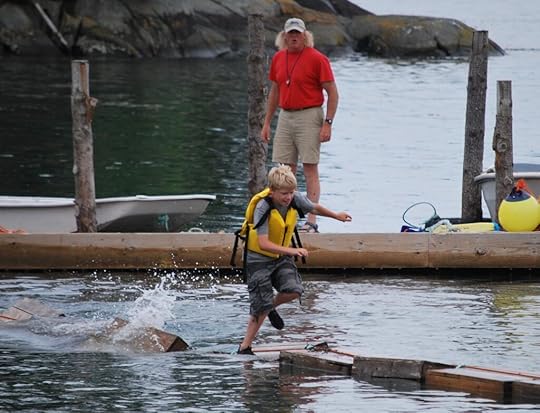
Canadian writer Alistair MacLeod wrote only one novel in his lifetime. But that was enough to leave an imprint on readers. The last line of that book I believe captures the chemistry of a bond that sometimes happens between people and the place they live: “All of us are better when we are loved.” Both Patterson and the small coastal town of Cutler were each made better by the love they mutually shared for one another.
******
The return trip is now a memory filled with puffins and terns, nests amidst weather- beaten blinds perched on granite ledges in the shadows of seals peering from afar and cormorants spreading their wings to catch sunlight. And that little boy of 66 years ends the day with the same wonder in his eyes, excitement in his voice that greeted everyone that morning. He ferries the last of us to the landing, still talking, still sharing himself to the end. We shake hands and bid each other farewell. Captain Andy turns away from us and sets off to make ready for tomorrow, to help, to share, to love.
© 2023 RJ Heller
Published in The Quoddy Tides, April 14, 2023
The post A Downeast life in Cutler appeared first on RJ Heller.
Life Downeast
- R.J. Heller's profile
- 7 followers


